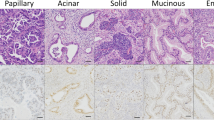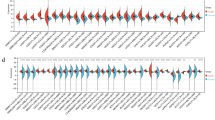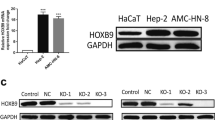Abstract
Hypoxia-inducible factor 3 subunit alpha (HIF3A) has been implicated in various types of cancers, while its precise role in the lung adenocarcinoma remains unclear. Our study aimed to investigate the roles of HIF3A in lung adenocarcinoma and its regulation by DNA methylation. We utilized bioinformatic tools, including UALCAN and KMPlot, to analyze the relationship between HIF3A expression, DNA methylation, and patient survival rate in lung adenocarcinoma. We also used siRNA-mediated knockdown of HIF3A and DNA-methyltransferase 1 (DNMT1), as well as the treatment of DNA methylation inhibitor 5-Azacytidine, in A549 and H1299 lung adenocarcinoma cell lines. qPCR, MTT, and cell counting assays were performed to evaluate the mRNA expression and cell viability. The bioinformatic analysis revealed that HIF3A expression was downregulated and its methylation was upregulated in lung tumor tissues. Additionally, Kaplan–Meier analysis indicated a correlation between low HIF3A expression and patient poor survival rate. We found that DNMT1 regulated HIF3A methylation. Knockdown of HIF3A promoted cancer cell proliferation. These data suggest that downregulation of HIF3A promotes tumor cell proliferation, and support that HIF3A methylation may serve as a prognostic factor for lung adenocarcinoma.





Similar content being viewed by others
Data availability
The raw data supporting the conclusions of this article will be made available on request to the corresponding author by email, as requested by our department.
References
Bjerre MT, Strand SH, Nørgaard M, Kristensen H, Rasmussen AK, Mortensen MM, Fredsøe J, Mouritzen P, Ulhøi B, Ørntoft T (2019) Aberrant DOCK2, GRASP, HIF3A and PKFP hypermethylation has potential as a prognostic biomarker for prostate cancer. Int J Mol Sci 20(5):1173
Brock MV, Hooker CM, Ota-Machida E, Han Y, Guo M, Ames S, Glöckner S, Piantadosi S, Gabrielson E, Pridham G (2008) DNA methylation markers and early recurrence in stage I lung cancer. New Engl J Med 358(11):1118–1128
Chandrashekar DS, Bashel B, Balasubramanya SAH, Creighton CJ, Ponce-Rodriguez I, Chakravarthi BV, Varambally S (2017) UALCAN: a portal for facilitating tumor subgroup gene expression and survival analyses. Neoplasia 19(8):649–658
Charloux A, Quoix E, Wolkove N, Small D, Pauli G, Kreisman H (1997) The increasing incidence of lung adenocarcinoma: reality or artefact? A review of the epidemiology of lung adenocarcinoma. Int J Epidemiol 26(1):14–23
Chen Q, Cao M, Ge H (2021) Knockdown of MALAT1 inhibits the progression of chronic periodontitis via targeting miR-769–5p/HIF3A axis. BioMed Res Int 2021:8899863
Dai Y, Xuan G, Yin M (2022) DUXAP8 Promotes LPS-induced cell injury in pulpitis by regulating miR-18b-5p/HIF3A. Int Dent J. https://doi.org/10.1016/j.identj.2022.11.011
Ehrlich M (2002) DNA methylation in cancer: too much, but also too little. Oncogene 21(35):5400–5413
Fuks F, Burgers WA, Brehm A, Hughes-Davies L, Kouzarides T (2000) DNA methyltransferase Dnmt1 associates with histone deacetylase activity. Nat Genet 24(1):88–91
Hoang PH, Landi MT (2022) DNA methylation in lung cancer: mechanisms and associations with histological subtypes, molecular alterations, and major epidemiological factors. Cancers (Basel) 14(4):961
Janaszak-Jasiecka A, Bartoszewska S, Kochan K, Piotrowski A, Kalinowski L, Kamysz W, Ochocka RJ, Bartoszewski R, Collawn JF (2016) miR-429 regulates the transition between Hypoxia-Inducible Factor (HIF) 1A and HIF3A expression in human endothelial cells. Sci Rep 6(1):22775
Jaskiewicz M, Moszynska A, Serocki M, Króliczewski J, Bartoszewska S, Collawn JF, Bartoszewski R (2022) Hypoxia-inducible factor (HIF)-3a2 serves as an endothelial cell fate executor during chronic hypoxia. EXCLI J 21:454
Kulis M, Esteller M (2010) DNA methylation and cancer. Adv Genet 70:27–56
Lánczky A, Győrffy B (2021) Web-based survival analysis tool tailored for medical research (KMplot): development and implementation. J Med Internet Res 23(7):e27633
Mahapatra S, Klee EW, Young CY, Sun Z, Jimenez RE, Klee GG, Tindall DJ, Donkena KV (2012) Global methylation profiling for risk prediction of prostate cancer. Clin Cancer Res 18(10):2882–2895
Malhotra J, Malvezzi M, Negri E, La Vecchia C, Boffetta P (2016) Risk factors for lung cancer worldwide. Eur Respir J 48(3):889–902
Mansell T, Ponsonby A-L, Januar V, Novakovic B, Collier F, Burgner D, Vuillermin P, Ryan J, Saffery R, B. I. S. I. T. P. V. A.-L. P. J. C. K. A. M. T. R. S. S. R. D. B. T. D. K. J. P. Sly (2019) Early-life determinants of hypoxia-inducible factor 3A gene (HIF3A) methylation: a birth cohort study. Clin Epigenetics 11:1–12
Minna JD, Roth JA, Gazdar AF (2002) Focus on lung cancer. Cancer Cell 1(1):49–52
Molina JR, Yang P, Cassivi SD, Schild SE, Adjei AA (2008) Non-small cell lung cancer: epidemiology, risk factors, treatment, and survivorship. Mayo Clin Proc 83:584–594
Myers DJ, Wallen JM (2022) Lung adenocarcinoma. StatPearls [Internet], Treasure Island (FL): StatPearls Publishing
Pathak R, Villaflor VM (2021) Histologic transformation in EGFR-mutant lung adenocarcinomas: mechanisms and therapeutic implications. Cancers (Basel) 13(18):4641
Shen J, Song R, Ye Y, Wu X, Chow W-H, Zhao H (2020) HIF3A DNA methylation, obesity and weight gain, and breast cancer risk among Mexican American women. Obes Res Clin Pract 14(6):548–553
Svedružić ŽM (2011) Dnmt1: structure and function. Prog Mol Biol Transl Sci 101:221–254
Wang D, Zhang S, Chen F (2018) High expression of PLOD1 drives tumorigenesis and affects clinical outcome in gastrointestinal carcinoma. Genet Test Mol Biomarkers 22(6):366–373
Yan Y, Zhang L, Zuo Y, Qian H, Liu C (2020) Immune checkpoint blockade in cancer immunotherapy: mechanisms, clinical outcomes, and safety profiles of PD-1/PD-L1 inhibitors. Arch Immunol Ther Exp (warsz) 68:1–15
Yang P (2009) Epidemiology of lung cancer prognosis: quantity and quality of life. Cancer Epidemiol 471:469–486
Yazdani B, Sirous H (2021) HIF3A: a potent prognostic biomarker in different kinds of cancer. https://doi.org/10.20944/preprints202104.0265.v1
Zöchbauer-Müller S, Minna JD, Gazdar AF (2002) Aberrant DNA methylation in lung cancer: biological and clinical implications. Oncologist 7(5):451–457
Funding
The study was supported by Fuzhou Science and Technology Bureau (AFZ2019S040076).
Author information
Authors and Affiliations
Contributions
Data curation: Qin Shi, Xiuxia Zheng, Ying Hu, Zhan Zhou, Minshan Fang and Xinhui Huang; Project administration: Qin Shi; Supervision: Qin Shi; Writing—original draft: Qin Shi, Xiuxia Zheng, Ying Hu, Zhan Zhou, Minshan Fang and Xinhui Huang; Writing—review and editing: Qin Shi, Xiuxia Zheng, Ying Hu, Zhan Zhou, Minshan Fang and Xinhui Huang.
Corresponding author
Ethics declarations
Ethical approval
The authors have no ethical conflicts to disclose.
Consent to participate
N/A.
Consent to publish
Current study is available from the corresponding author on reasonable request.
Competing interests
The authors declare that they have no competing interests.
Additional information
Communicated by: Ewa Ziętkiewicz
Publisher's Note
Springer Nature remains neutral with regard to jurisdictional claims in published maps and institutional affiliations.
Rights and permissions
Springer Nature or its licensor (e.g. a society or other partner) holds exclusive rights to this article under a publishing agreement with the author(s) or other rightsholder(s); author self-archiving of the accepted manuscript version of this article is solely governed by the terms of such publishing agreement and applicable law.
About this article
Cite this article
Shi, Q., Zheng, X., Hu, Y. et al. Methylation of hypoxia-inducible factor 3 subunit alpha contributes to poor prognosis in lung adenocarcinoma. J Appl Genetics 64, 769–777 (2023). https://doi.org/10.1007/s13353-023-00784-6
Received:
Revised:
Accepted:
Published:
Issue Date:
DOI: https://doi.org/10.1007/s13353-023-00784-6




